Simple Question #5 - What is Time? Will it ever stop or reverse?
Hey friends, I am really happy about the consistent success of my simple question series. Hard work really pays!
Inspired by one of the comments of @LeMouth, I have written this new episode of the Simple Question Series. It deals with one of the simplest topics which is deeply rooted in our very understanding of almost everything — Time. In this episode I shall discuss different mind blowing questions and try to unveil some secrets of time. What is time after all?
So let's begin!
What is TIME? Is it real or just a concept?
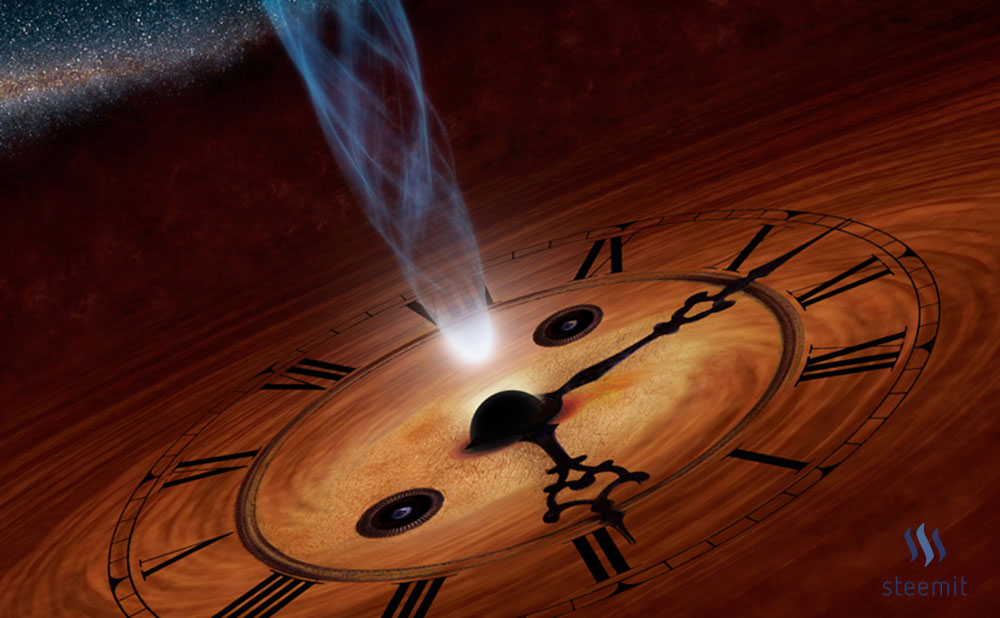
Time throughout the Universe | World Science Festival
We spent a lot of time talking about time but almost no time talking about what time actually is! We check time all the time. We talk about having good times, bad times, old times and even crazy times. We save time, make time, cut time, pass time and what not. It waits for no man or woman. Sometimes it flies away and sometimes it creeps on you. Most of the time, we simply run out of time.
But what time actually is? Is it a physical thing like space and matter, or an abstract concept which we have created through our experiences?
If you're thinking that physicists have an answer, then you are wrong. Time is still one of the greatest mysteries in physics which questions the very definition of physics itself. This is the simplest puzzling question asked by a five-year old and also by the greatest physicists. But unfortunately none have the answer.
There is nothing new in the pursuit of the definition of time. Humans are brainstorming about it since time immemorial. Early humans used to calculate time by looking at the position of the sun in the sky.
Ancient philosopher, Plato in the Timaeus, considered
"Time as the period of motion of the heavenly bodies" [1]
Later his student Aristotle, in Book IV of his Physics, defined
"Time as the number of changes with respect to before and after." [2]
So we see, time was and is still a head scratching topic.
Later on with the development of science and technology we got to know more and more about different aspects of time and its effects. But still we could not find its real cause.
Knowing the complexity of this simple question "What is Time?", Einstein, when he was asked, simply said:
"Time is that which a clock measures"
This is what is called an operational definition. But it should better be called an escape.

Einstein's clock :D | Pexels
So why are we not able to explain time? Well, this is not the only case. There are many other basic things staring us right in the face, we don't have any clearer explanations for. Like biologists have been arguing for decades about the definition of life and cosmologists have been arguing about the extent of the universe.
This type of problem raises the possibility that we could be looking at things all wrong, as we have done in the past (e.g. "The Earth is flat" or "Hey, let me put some leeches is on you to cure your disease"). Maybe aliens can understand time more easily through their alienatic way of thinking and experiencing life.
There is difficulty in defining time probably because it is very much ingrained in our experiences and our way of thinking. Time is how we relate the 'now' we have now with the 'now' that we had before. But time is also about the future and how we relate it with the past and our present experiences.
This is how physics thinks about time. In fact, time is embedded in the very definition of Physics, and maybe this is the reason because of which we are facing difficulties in defining time. This is how Wikipedia defines Physics:
"Physics is the natural science that involves the study of matter and its motion and behaviour through space and time."
So in the definition of Physics we have 'time' as an element. Even the word 'motion' assumes the concept of time. Actually the basic job of physics is to use the past to understand what futures are possible and how we can affect them. Physics is meaningless without time.
So what exactly is Time? Is it a dimension?
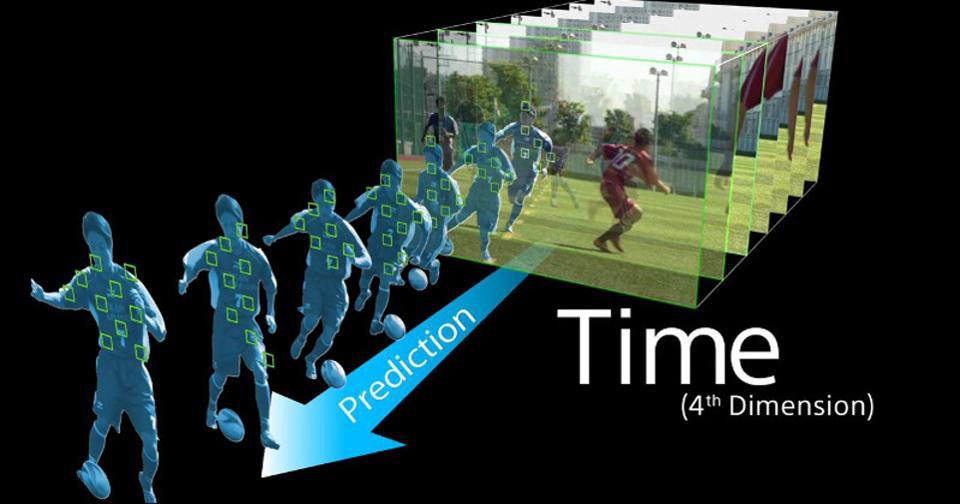
Snapshots of Time Dimension | Forbes
Time is the factor due to which our present moment fades away into past and we move towards future. If we consider our every single moment as a snapshot, we will find each is frozen, static, just like a photograph. If there were no concept like time, then the universe would have been one of those frozen snapshots, incapable of change or motion.
But fortunately, our universe is much more interesting; there is movement and change in it and many strange events are taking place at every moment. So those snapshots don't exist independently in our universe. Time relates them to each other in two important ways.
First, it connects the snapshots together in a chain, putting them in a particular order. This is similar to what happens when different still images are connected and animated to create a movie.
Secondly, time arranges these snapshots in such a way that the next snapshot depends on the previous one. That means each moment in the universe depends on what happened just before it. This is nothing more than cause and effect. For example, you can’t be sitting on sofa watching TV at one moment and then be halfway through a marathon in the next.
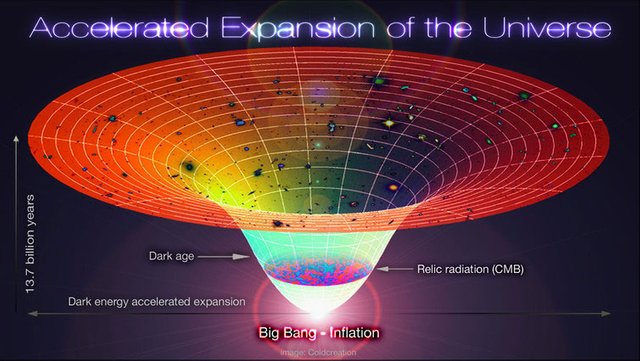
The Big-Bang inflation : Cause - Effect? | The Conversation
This is how laws of Physics work, after observing the present status they tell us how the universe can change and how it cannot. Physics also considers time as the fourth dimension.
As time bears some striking similarity to another fundamental part of the universe: space, it is possible that both are part of a greater continuum. The same logic of slicing our journey through time into static snapshots can also be applied to space (like slicing a solid we get a plane, slicing a plane we get a line and slicing a line we get a point). This leads us to consider the possibility that time and space are closely related. Indeed, modern physics, considers it better to use them in combined form: space-time, because of their similarities. Just like space, time may also be considered as another direction in which we can move.

Describing motion on Space-Time Plane | We Have No Idea
In fact, in every type of motion time is a fundamental entity. Physics better uses the space-time plane to describe a motion. It becomes mathematically simpler and clearer if we treat time as the fourth-dimension (assuming we have only three spatial dimensions).
Don't get too much excited. This connection between time and space doesn't mean that you can regard time as a dimension of space with all of the implications that come with it. You can imagine time and space as mango and orange respectively, both are fruits but their tastes are different. There are many more mysteries yet to be unveiled, just keep reading.
Why does time move forward? Will it ever stop or reverse?
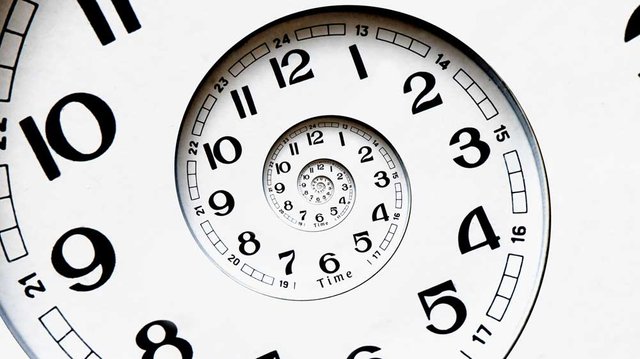
Inexorable march of Time in reverse - Counter-Clock | Pexels
Imagine time moving backwards, you will grow younger instead of becoming older, forgetting your experiences and unlearning everything you know and you would finally end as a twinkle in your parents' eyes. This is how the science fiction writer Philip K. Dick represents time in his novel Counter-Clock World.[3] But unfortunately this is not possible in our universe. Time's direction is another issue that cosmologists are grappling with.
We can remember things that happened in the past but not the things that happen in the future. There are irreversible processes. It seems that time has a preferred direction. The basic question – "Why does time move forward?", has puzzled physicists for a long time. In fact, what does "forward in time" even mean? In some universes where time moves the other way, the scientists make call that direction forward. Really interesting huh!

Final result of entropy increase | We Have No Idea
Now let's come to the point, why does time move in the direction it does? This idea of the arrow of time goes back to the age of Ludwig Boltzmann (1870) who figured out the thing called ‘entropy’. As I have discussed in couple of my previous episodes, entropy is the measure of disorder and it tends to grow. This is the second law of thermodynamics: entropy increases with time in this universe and things become more disorderly. For example, if you neatly stack papers on your desk and walk away, you won't be much surprised to find them in a mess when you come back. But, you definitely get surprised when papers in mess stack neatly all by themselves. This is entropy, the arrow of time.
So, entropy is one physical law which cares about how time flows. But many of the processes like the laws of kinematics that affect how gas molecules bounce off one another, could work perfectly even if time flows backward. But, in aggregate, they follow a law that requires the amount of order to decrease with time. So, time and entropy have definitely some connection. But we cannot say whether entropy causes time to flow or the arrow of time causes entropy to increase.
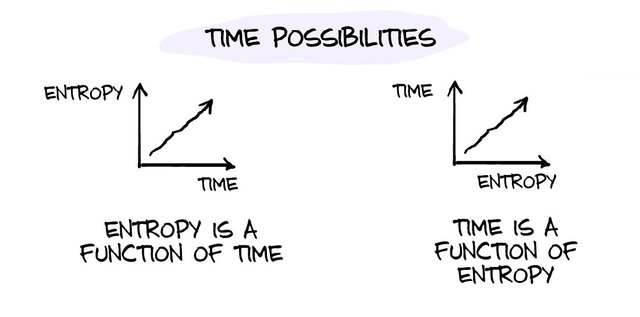
Time - Entropy Possibilities | We Have No Idea
Even if we accept the idea that time flows due to entropy increase, but why entropy was so low before Big Bang? Was there no time dimension before Big Bang?
It is really difficult to believe that the papers were neatly stacked at the beginning of the universe. How that extreme order achieved in that universe?
It's really weird, isn't it? But physicist Sean Carroll thinks differently. He believes that our universe is a part of a bigger multiverse. Like, there can be neatly stacked papers (low entropy) on the desk. But that desk is a part of a room and that room is a part of a house and that house is situated in a city. So there can be a low entropy condition on the desk but there are high entropy conditions throughout the city as a whole. Going through this line of thought, Sean Carroll hints that the Big Bang was not the beginning. And if that's correct, then the question becomes "Why did a part of the universe go through a phase of low entropy condition?" And this might be easier to answer.
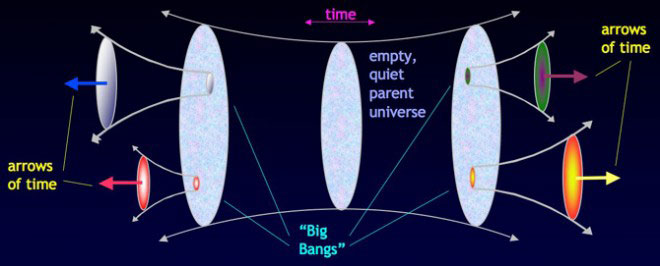
Sean Carroll's Multiverse Model | Wired
So, Sean Carroll proposes a different model of the universe. He suggests a static universe (or better say a multiverse) where the arrow of time doesn't exist. There's no future versus past, everything is equal to each other. From that static universe, different smaller universes pop-off and travel in different directions of time. How can anything occur in that static universe without the presence of time? Regarding this Sean Carroll argues that events that happen in that universe don't have causality, don't have progress, don't have memory and don't have aging or metabolism or anything like that. There are just random fluctuations. As in quantum mechanics, things can happen occasionally. Things can fluctuate into existence. There is a probability for a change to occur. [4]
It's tempting to dismiss the notion of time stopping right out of the gate. We have never seen time doing anything else except to going forward. But if the arrow of time is the function of the second law of thermodynamics i.e. entropy increase, then some speculations can be made. What will happen when the universe reaches maximum entropy? That universe will be in highest disorder, and an equilibrium will be maintained where no order could be created. At that moment time will either stop or it will have no meaning.
Some philosophers even speculate that, at that moment the arrow of time will reverse itself and entropy will start decreasing, leading the universe to shrink back to a tiny singularity. But this is more a speculation than a scientific prediction. What will actually happen to the universe and its laws, we don't know at all.
Some Final Words
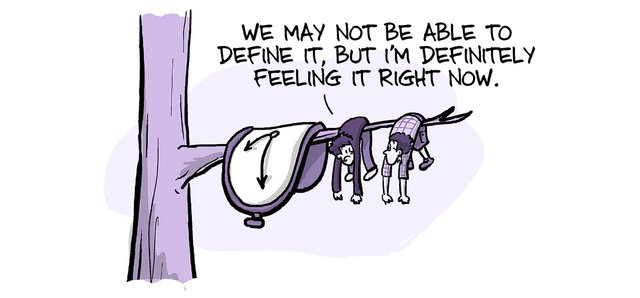
We are feeling time right now :D | We Have No Idea
Time is something which is an integral part of not only our lives but also the whole universe. Physicists are trying hard to tackle these mind bending peculiarities of time. We can't stop time to study it and we can't make repeated time measurements of the same event. But still there is quest for the knowledge, as human curiosity demands for it.
I hope this article was not boring. I am trying hard to improve my writing skills to write engaging science articles.
But this is not the end of the question, "what is time?". There are many more surprising features of time yet to be discussed. So much is left of this timeless topic. We'll be tackling more amazing questions like, "Do we all feel time the same way?", "Why do we have the highest speed limit?", "What will happen if we time travel?" and many more in the next episode.
Till then stay tuned and save your time as time is money.
But be grateful to give your time to upvote this post if you like it. This will keep me motivated. :)
Your upvote will earn me some SP to improve my position on steemit and to buy some more books to bring more awesome contents like this.
I will be very much obliged if you RESTEEM this post.
Please comment and share your feedback.
References
[1] - Timaeus : https://en.wikipedia.org/wiki/Timaeus_(dialogue)
[2] - Physics, Book IV : http://classics.mit.edu/Aristotle/physics.4.iv.html
[3] - Philip K. Dick : Counter-Clock World
[4] - Sean Carroll, Jan 2010 : From Eternity to Here: The Quest for the Ultimate Theory of Time
[•] - Jorge Cham and Daniel Whiteson (2017) : We Have No Idea
Previous Episodes of the Series
- Simple Question #1 - Why do we Dream? What is its purpose?
- Simple Question #2 - What is Life? Why does it exist at all?
- Simple Question #3 - How big is the Universe? What is its Shape?
- Simple Question #4 - Should we eat Meat? Why and Why Not?



Awesome work from one of the best bloggers on Steemit! Keep it up bru!
You are also no less in blogging. I am inspired by your hardwork on steemit.
Thank you so much bro. :)
This is awesome. i found myself so engrossed in this and the concept of entropy is all just so marvelling.
Thank You so much for this
Thanks for your feedback. :)
Explaining Time in terms of Entropy is a really fascinating idea, for it poses a question of self-referencing.
This was super interesting, I think about this topic occasionally but it always seem to conjure up more and more questions and you just get lost in a world of abstraction eventually!
Look forward to more "simple" questions :-)
Amazing article bro. Really appreciate the hardwork you have put in this post. :)
Thanks bro. :)
Very insightful post which definitely deserves an upvote. Thank you!
Thank you so much bro. :)
Resteemed to over 4000 followers and 100% upvoted. Thank you for using my service!
Read here how the new bot from Berlin works.
@resteem.bot
This post received a 1.5% upvote from @randowhale thanks to @badastroza! For more information, click here!
Congratulations! This post has been upvoted from the communal account, @minnowsupport, by nitesh9 from the Minnow Support Project. It's a witness project run by aggroed, ausbitbank, teamsteem, theprophet0, someguy123, neoxian, followbtcnews/crimsonclad, and netuoso. The goal is to help Steemit grow by supporting Minnows and creating a social network. Please find us in the Peace, Abundance, and Liberty Network (PALnet) Discord Channel. It's a completely public and open space to all members of the Steemit community who voluntarily choose to be there.
@nitesh9 got you a $9.07 @minnowbooster upgoat, nice! (Image: pixabay.com)
Want a boost? Click here to read more!